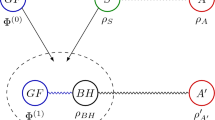Abstract
When enough matter is condensed in a small region, gravitational effects will be strong enough to cause collapse and a black hole will be formed. We formulate and prove here such a statement in the language of general relativity. (This is Theorem 2 of this paper.)
Similar content being viewed by others
References
Hawking, S., Penrose, R.: The singularities of gravitational collapse and cosmology. Proc. R. Soc. London Ser. A314, 529–548 (1970)
Penrose, R.: Gravitational collapse and space-time singularities. Phys. Rev. Lett.14, 57–59 (1965)
Schoen, R., Yau, S.-T.: Positivity of the total mass of a general space-time. Phys. Rev. Lett.43, 1457–1459 (1979)
Schoen, R., Yau, S.-T.: Proof of the positive mass theorem. II. Commun. Math. Phys.79, 231–260 (1981)
Fischer-Colbrie, D., Schoen, R.: The structure of complete stable minimal surfaces in 3-manifolds of non-negative scalar curvature. Commun. Pure Appl. Math.33, 199–211 (1980)
Author information
Authors and Affiliations
Additional information
Communicated by A. Jaffe
Rights and permissions
About this article
Cite this article
Schoen, R., Yau, S.T. The existence of a black hole due to condensation of matter. Commun.Math. Phys. 90, 575–579 (1983). https://doi.org/10.1007/BF01216187
Received:
Issue Date:
DOI: https://doi.org/10.1007/BF01216187




